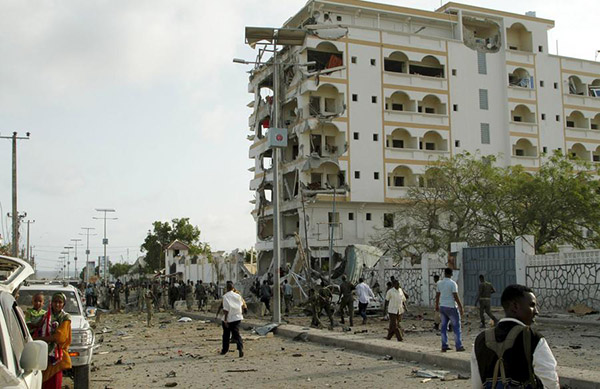
Thursday July 30, 2015

The Jazeera Palace hotel, which housed China's embassy in Somalia, after the suicide car bomb attack in Mogadishu, July 26.
China's hopes of resuming assistance in various projects in Somalia have been dashed after the latest suicide attack in the capital Mogadishu.A Chinese security official at the embassy in Somalia was one of 13 people killed on July 26 when the suicide bomber rammed a truck into a hotel in which the embassy is housed."The overall situation in Somalia is not good. It is chaotic and dangerous," said Qian Wenbin, a sales representative of Shenzhen Mindray Bio-Medical Electronics Co. Qian goes to Somalia every year and stays there for three or four days to conduct surveys in hospitals and visit clients.
Yicai.com, the website of Shanghai's China Business News has learned that there are currently no Chinese enterprises taking part in investment or other projects in Somalia.
The Somali government is hoping that China will expand or maintain construction projects that were terminated before the eruption of the civil war there, or at least embark on feasibility studies. Yicai said Chinese contractors have not obtained any business contracts in 2013 or 2014.
Somalia is one of the least developed countries in the world. Its economy is based on herding and it has a weak industrial basis. This, coupled with years of civil wars, has led to serious destruction of infrastructure, industrial and agricultural production that has led the economy to the verge of collapse.
The situation in some areas is stable and the economy better but still at a low level. Per capita GDP was only US$112 in 2011, and the foreign currency revenues have come mainly from remittances by expatriates working overseas.
Before the eruption of civil war, China helped the country build its biggest hospital for women and children, a stadium, a national theater, a university and factories in the capital. All these facilities are now in need of maintenance or restoration.
Liu Quijin, special Foreign Ministry envoy on China-Africa Cooperation, during a visit to Somalia in late May and early June, conveyed an important message that China will continue to offer support and assistance to Somalia if safety can be guaranteed.
Somalia hopes China will help repair or maintain the special projects and step up exchanges and cooperation in the areas of infrastructure, trade, investment, education, vocational training, peace and security, as well as governance. It has also expressed sincere welcome for Chinese enterprises to invest in the country.
China, on the other hand, is said to have engaged in feasibility studies on various projects and one under consideration is an expansion of the hospital for women and children.
The health situation in Somalia is serious and 3.2 million people are in need of humanitarian assistance. In the country, eight children aged under 5 die every hour and one pregnant woman dies from complications due to pregnancy every two hours. One quarter of the children are long-term malnourished and two thirds of Somali people lack access to safe drinking water.
On July 23, the World Health Organization issued a warning that humanitarian donations will be cut dramatically in 2015 and the foreseeable 2016 and that the present medial services will be unable to be maintained. As such, 1.5 million people will lose fundamental medical care.
Terrorism is the biggest threat to China's investment in Somalia, however. The latest attack on the Chinese embassy, which only reopened last year after years of civil war, has undoubtedly slowed the pace of Chinese assistance and investment.
Liu Guijin said in a recent interview with China Business News that terror attacks are one of the risks faced by China in its investment in the country.
The radical Somali Youth League has expanded its attacks on neighboring Kenya, Ethiopia and Djibouti, which are the three major countries in East Africa in terms of Chinese investment. China became the biggest foreign investor in Kenya in 2011 and 2012. As of the end of 2013, China's investment in Kenya had reached US$530 million. In Ethiopia, China's direct investment had amounted to US$770 million as of the end of 2013, while contracted orders amounted to US$22.4 billion. Djibouti, meanwhile, has a good harbor and welcomes Chinese investment.